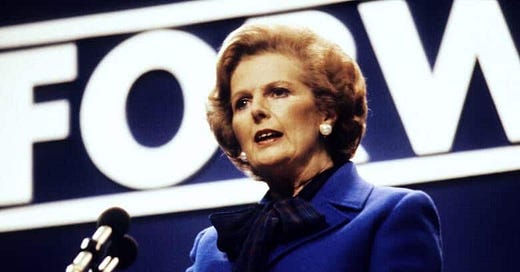by Rod D. Martin
April 11, 2002
At the end of March, just before announcing she would never again speak in public, Margaret Thatcher capped off her remarkable career with the Times serialization of her new book Statecraft, sounding a note of vision and patriotism worthy of Washington's Farewell Address.
The European Union is "fundamentally unreformable," the former Prime Minister thundered from the page. Enoch Powell was right: Britain is quickly being subsumed into a socialist superstate, and soon the heritage of a millennium will irretrievably disappear into the continental quagmire.
Or, as this author has written on occasion, Europe, in trying to reinvent the USA, is actually recreating the USSR; and Britain better get out now.
Thatcher states that Britain should renegotiate the terms of its EU membership to allow what amounts to secession: the right to leave the common agricultural and fisheries policies, the common foreign and security policy, even the common trade policy. But she knows this is impossible: the result could only be either Britain's withdrawal or expulsion.
This does not bother her in the least. As she writes in Statecraft: "It is frequently said to be unthinkable that Britain should leave the European Union. But the avoidance of thought about this is a poor substitute for judgment."
What Thatcher wants, and what many Britons thought the then-EEC would be when they joined it, is a European NAFTA: free trade without political institutions. But she knows it's too late for this. And so she proposes a truly revolutionary solution, that which Conrad Black (as well as this author) suggested almost four years ago.
She proposes that Britain join NAFTA itself.
It is a compelling notion. Sure, Britain must be part of a free-trade zone; but why must it be part of a trade zone which is not free? Why must the price of trade be the subordination of democratic government to the unelected bureaucracy of Brussels? Why must the Queen's profile no longer grace the currency (if not now, soon)? Why must trade involve political integration at all?
In NAFTA, it doesn't. But in the New Europe, Britons are an increasingly tiny minority in a transnational monster that shares neither their history nor their values nor their common law tradition nor their worldview. As Thatcher rightly sees, her country is following Hong Kong into submission to a socialist, largely-hostile foreign government. And that submission grows more nearly irreversible every day.
A North Atlantic Free Trade Agreement -- based purely on trade -- is a good idea regardless. Besides sharing America's and Canada's core political and economic culture, the UK is already America's largest foreign investor. Britain's economic ties to other potential NAFTA members (such as Chile, Argentina and South Korea) run long and deep; its investment capital would help America shoulder the burden of Mexico; and keeping Sterling viable would not only maintain British sovereignty but blunt the Euro's challenge to the dollar.
Significantly, British NAFTA membership would reinforce our most important military alliance (which the EU increasingly subverts). It would also encourage the addition of other non-North American members, helping curtail regionalism and encouraging economic growth in areas (again, like Mexico) which trouble us primarily because of their poverty.
But most importantly, British membership in NAFTA would help ensure the trade group's non-governmental nature. Like the 13 American colonies before them, the European states are forming a union of relative equals. But the sheer size of the United States would render the smaller NAFTA members positively terrified of any proposed diminishing of sovereignty. Powerful supranational institutions for them would mean functional absorption into a new American Empire; and Britain in particular has no wish to become our 51st state.
Even apart from these things, Americans should take up Thatcher's call. A profound anti-Americanism lies at the heart of European "federalist" thinking. France has explicitly promoted the pan-European project as a means of "resisting" America politically and culturally, the late President Mitterand actually saying he supported it because "we are at war with America." Post 9/11, these thoughts have been given voice across the continent.
This is no mere jealousy of America's superpower status. Continental Europe, dominated for a quarter-millennium by left-wing Enlightenment thought, holds a deep hostility to Anglo-Saxon democratic capitalist values, such as concern for individual liberties, suspicion of the state, and devotion to ancient constitutions. And because Britain's mere existence proclaims these values, Britain will always be at the periphery of the new European order; forever outvoted, outnumbered and outgunned.
Yet, as Lady Thatcher well realizes, Britain is at the heart -- geographically, culturally and politically -- of a better, Atlantic community. It need surrender nothing of its sovereignty; indeed, as the whole 20th century showed, its increasing submission to the leftists of Brussels will destroy the very prosperity EU membership was supposed to bring.
Clearly, the time for Lady Thatcher's final vision has come.




